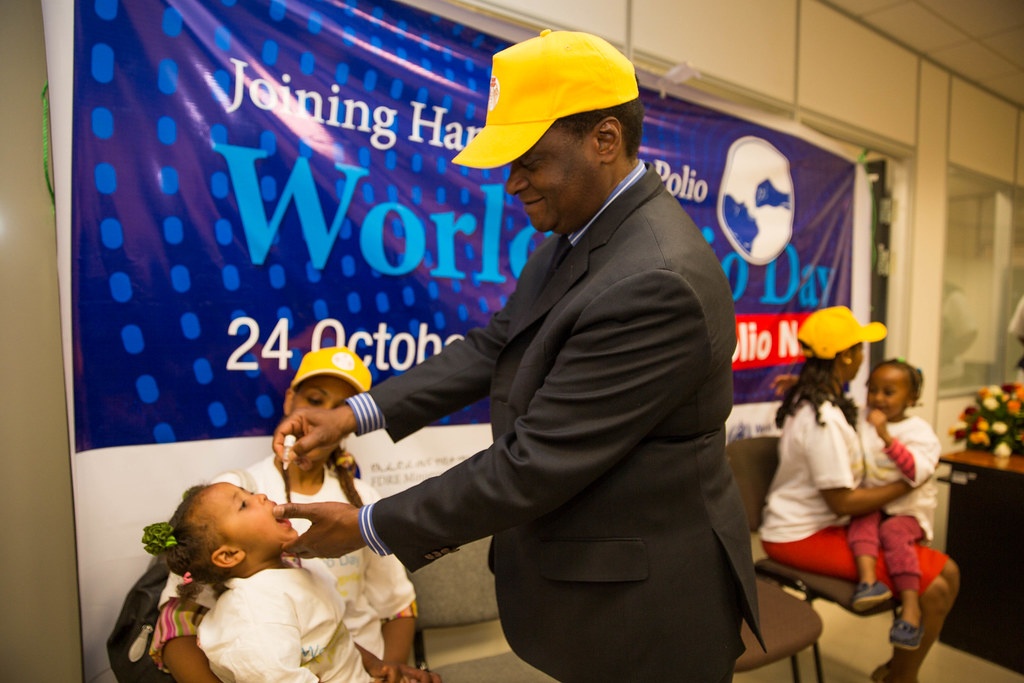The celebration of World Polio Day on 24th October brings us all a much-needed piece of good news.
Back in August, while the COVID-19 pandemic was still rife, Africa was certified free of wild polio. Although the disease remains endemic in two countries, this constitutes a historic public health milestone for humanity. The World Health Organisation estimates that the successful eradication campaign, which began in 1996, has saved 1.8 million children from paralysis and prevented 180,000 deaths.
Two of the three strains of wild poliovirus – which causes the poliomyelitis disease – have already been eradicated globally. As of August, the Africa Regional Certification Commission marked the continent free of the remaining strain, with no cases in 4 years and 95% of the population immunised. It now only remains endemic in Afghanistan and Pakistan, and Africa only has the vaccine-derived poliovirus remaining.
This was achieved through regional and global cooperation, with all governments in the region committing to national immunisation, supported by instrumental funding and support from numerous groups, countries and individuals. Mandela launched the ‘Kick Polio out of Africa’ programme in 1996, following a unanimous declaration by governments in the Organization of African Unity (now the African Union) to eradicate polio from the continent. This African-led commitment began when every African country was affected by the disease – with an estimated 75,000 children being paralysed annually.
Since then, 9 billion polio vaccines have been provided by millions of volunteers and health workers – some of whom have sacrificed their lives. Strong leadership and cooperation enabled unique challenges to be overcome in this decades-long battle, including violent conflicts and porous borders. Polio teams began launching mass vaccination campaigns – eventually even ones synchronised across countries to combat cross-border transmission. In 1999, UN Secretary-General Kofi Annan began a successful initiative to negotiate several ceasefire agreements in regional conflicts to allow immunisations.
The support of international partners and donors cannot be overlooked. One key donor was Rotary International, a leading and early figure in global polio eradication since the 1980s. It is a founding partner in the Global Polio Eradication Initiative (GPEI) – a public-private partnership led by national governments, with five partners – the WHO, Rotary International, the US Centers for Disease Control and Prevention (CDC), UNICEF and the Bill & Melinda Gates Foundation. It constitutes the largest public health effort ever, with a central role in supporting this achievement. With the UK being the second largest public-sector donor to this, the latest International Development Secretary Anne-Marie Trevelyan rightly stated that this year’s achievement was ‘in large part thanks to UK aid helping to vaccinate children and strengthen health systems across the continent’.
This demonstrates the value of our aid budget, in terms of saving lives but also British soft power when its future seems at risk. As well as cuts due to the battered British economy, Boris Johnson’s abolishment of the Department for International Development this year has been criticised by many. Namely, three former Prime Ministers, the Labour Party, many MPs in his own party and the humanitarian and development sector.
Almost 200 humanitarian and development charities and organisations have called for the reversal of this, warning that,
“professionals now fear UK aid will increasingly be diverted away from helping people, and instead used for trade deals or our political agenda.”
Indeed, the decision was made, without consultation, by a Prime Minister who has previously argued that UK aid should be spent “more in line with Britain’s political, commercial and diplomatic interests.“
The investment in the fight against polio will continue to reap returns. It has improved the Africa’s public health infrastructure and outbreak response, trained skilled healthcare workers and left models which have been deployed for other outbreaks including measles and rubella. The polio teams also have a history of quickly responding to non-polio outbreaks – most recently in the vital and life-saving work during the coronavirus pandemic.
Rotary International’s President and the Director-General of the WHO declared that,
“the human resources, skills and experience gained in the process [of polio eradication] leave behind a legacy in how to tackle diseases and reach the poorest and most marginalised communities with life-saving services.”
This hope-inspiring success story proves that the gravest public health issues can be overcome when the world puts aside divisions and cooperates.
Kartik Sareen
Featured Image Source: Flickr

